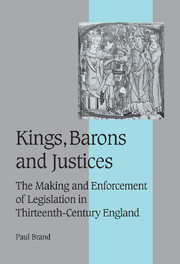Book contents
- Frontmatter
- Contents
- List of tables
- Preface
- List of abbreviations
- INTRODUCTION
- Part I Politics and the legislative reform of the common law: from the Provisions of Westminster of 1259 to the Statute of Marlborough of 1267
- Chapter 1 THE MAKING OF THE PROVISIONS OF WESTMINSTER: THE PROCESS OF DRAFTING AND THEIR POLITICAL CONTEXT
- Chapter 2 THE MAKING OF THE PROVISIONS OF WESTMINSTER: THE SOCIAL AND LEGAL CONTEXT AND THE EVOLUTION OF THE INDIVIDUAL CLAUSES: I
- Chapter 3 THE MAKING OF THE PROVISIONS OF WESTMINSTER: THE SOCIAL AND LEGAL CONTEXT AND THE EVOLUTION OF THE INDIVIDUAL CLAUSES: II
- Chapter 4 THE ENFORCEMENT OF THE PROVISIONS OF WESTMINSTER DURING THE INITIAL STAGE OF THEIR EXISTENCE, 1259–63
- Chapter 5 THE REVISION AND REISSUING OF THE PROVISIONS, 1263–4
- Chapter 6 THE REVISED PROVISIONS IN ACTION, 1263–7
- Chapter 7 THE FINAL REVISION AND REISSUE OF THE PROVISIONS OF WESTMINSTER: THE STATUTE OF MARLBOROUGH OF 1267
- Part II Beyond politics: the enforcement and interpretation of the Statute of Marlborough in the courts, 1267–1307
- Chapter 16 CONCLUSIONS
- Appendix I TEXT AND TRANSLATION OF THE PROVISIONS OF WESTMINSTER OF 1259
- Appendix II TEXT AND TRANSLATION OF THE PROVISIONS OF WESTMINSTER AS REISSUED IN 1263 AND 1264
- Appendix III TEXT AND TRANSLATION OF THE STATUTE OF MARLBOROUGH OF 1267
- Bibliography
- Index
- Cambridge Studies in Medieval Life and Thought Fourth series
Chapter 1 - THE MAKING OF THE PROVISIONS OF WESTMINSTER: THE PROCESS OF DRAFTING AND THEIR POLITICAL CONTEXT
Published online by Cambridge University Press: 16 June 2009
- Frontmatter
- Contents
- List of tables
- Preface
- List of abbreviations
- INTRODUCTION
- Part I Politics and the legislative reform of the common law: from the Provisions of Westminster of 1259 to the Statute of Marlborough of 1267
- Chapter 1 THE MAKING OF THE PROVISIONS OF WESTMINSTER: THE PROCESS OF DRAFTING AND THEIR POLITICAL CONTEXT
- Chapter 2 THE MAKING OF THE PROVISIONS OF WESTMINSTER: THE SOCIAL AND LEGAL CONTEXT AND THE EVOLUTION OF THE INDIVIDUAL CLAUSES: I
- Chapter 3 THE MAKING OF THE PROVISIONS OF WESTMINSTER: THE SOCIAL AND LEGAL CONTEXT AND THE EVOLUTION OF THE INDIVIDUAL CLAUSES: II
- Chapter 4 THE ENFORCEMENT OF THE PROVISIONS OF WESTMINSTER DURING THE INITIAL STAGE OF THEIR EXISTENCE, 1259–63
- Chapter 5 THE REVISION AND REISSUING OF THE PROVISIONS, 1263–4
- Chapter 6 THE REVISED PROVISIONS IN ACTION, 1263–7
- Chapter 7 THE FINAL REVISION AND REISSUE OF THE PROVISIONS OF WESTMINSTER: THE STATUTE OF MARLBOROUGH OF 1267
- Part II Beyond politics: the enforcement and interpretation of the Statute of Marlborough in the courts, 1267–1307
- Chapter 16 CONCLUSIONS
- Appendix I TEXT AND TRANSLATION OF THE PROVISIONS OF WESTMINSTER OF 1259
- Appendix II TEXT AND TRANSLATION OF THE PROVISIONS OF WESTMINSTER AS REISSUED IN 1263 AND 1264
- Appendix III TEXT AND TRANSLATION OF THE STATUTE OF MARLBOROUGH OF 1267
- Bibliography
- Index
- Cambridge Studies in Medieval Life and Thought Fourth series
Summary
On 24 October 1259, towards the end of a session of parliament, the Provisions of Westminster were read out in Westminster Hall in the presence of King Henry III, many of his earls and barons and a large number of other people. The Provisions of Westminster were, by any reckoning, a major piece of legislation. No contemporary text of the Provisions numbers its clauses, but in the conventional modern enumeration first devised by William Stubbs and still used by scholars the Provisions consist of twenty-four clauses. The final text of the Provisions, as subsequently copied and sent out to the counties, and probably also as initially read out at Westminster, makes no direct mention of the session of parliament. It does, however, ascribe the making of the legislation to a meeting of the king and his magnates at Westminster (meaning a parliament) held a fortnight after Michaelmas (the week beginning 13 October) in the year of grace 1259 and in Henry III's forty-third regnal year. The date is probably the date parliament opened.
The Provisions directly reflect the exceptional political situation which existed at the time of their enactment, and the degree to which the king had agreed, or been compelled, to surrender the control of his administration to a group of his opponents, drawn from the baronage.
- Type
- Chapter
- Information
- Kings, Barons and JusticesThe Making and Enforcement of Legislation in Thirteenth-Century England, pp. 15 - 41Publisher: Cambridge University PressPrint publication year: 2003
- 1
- Cited by



